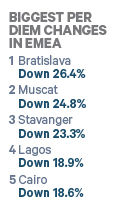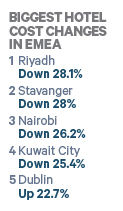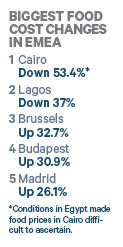
Business travel per diems for U.S. travelers visiting EMEA
fell for the second consecutive year in 2016. The average per diem, in U.S.
dollars, for the 59 EMEA cities in BTN's Corporate Travel Index was $308, down
from $323 in 2015 and $362 in 2014. An appreciation of the U.S. dollar against
most other currencies largely explained the fall in travel costs in 2015. This
time around, multiple factors came into play, including continued appreciation
of the dollar combined with political and economic weaknesses in a number of
markets.
Whether U.S. companies will enjoy a third year of cost
reductions on trips across the Atlantic in 2017 is unclear. "Right now,
the U.S. dollar is helping U.S. travelers," said HRG director of global
hotel relations Margaret Bowler. "Groups are finding that cities which
were previously expensive are now very affordable. But four factors will make
2017 volatile and much harder to call: Trump, Brexit, currency fluctuations and
security concerns. This volatility makes it very difficult to forecast what
will happen to pricing."

Europe
Brexit already has played its part in the 2016 figures.
London is no longer the most expensive city in EMEA once hotel, food and
miscellaneous costs are bundled together. The U.K. capital has slipped to
second, its per diem having plunged 15 percent to $468. That owes to a drop in
the pound against the dollar immediately after the June 23 referendum vote for
the U.K. to leave the European Union. In spite of this precipitous fall, London
retains the highest hotel rates in the outside the U.S., at $279. "London
hotel rates are fairly flat in local currency," said Bowler. "It is a
mixed picture for the city. The top end of the market is doing very well."
Zurich has assumed London's place at the summit of the EMEA
per diem list, even though Switzerland's financial hub dipped 2.6 percent to
$471 in daily costs. Immediately below London are two more Swiss cities: Basel,
at $442, and Geneva, at $432. Affluent Switzerland is an expensive country to
visit at the best of the times, but in difficult times it becomes even pricier,
as currency investors turn to the Swiss franc as a perceived ultra-safe haven.
Elsewhere in Europe, said Bowler, "the standout city in
terms of rate increases has been Dublin." Its hotel prices rose 22 percent
in 2016 to $191, which Bowler attributed to resurgent demand coupled with flat
supply. The Irish economy has bounced back from a severe hammering in the
global crisis of 2008, and it is expected to do even better over the next
couple of years by picking up investment from financial and other businesses
quitting the U.K. as Brexit approaches. Hotel rates in Dublin, therefore, could
push even higher.
Among European cities that have fared poorly is Istanbul.
Earlier this decade, Turkey's largest city was flourishing, one of the hottest
destinations for leisure, business and meetings travel alike. In 2016, its per
diem fell 17.2 percent to $213, as demand evaporated owing to a spate of terror
attacks and the increasing authoritarianism and chauvinism of President Recep
Tayyip Erdogan.
Also down, though for very different reasons, is Stavanger,
center of the struggling Norwegian oil industry. Its per diem decreased by 23
percent to $317. Bowler added that Aberdeen, Scotland, another key European oil
city, is also suffering. According to HRG's own figures, rates there are down
18 percent in local currency alone.

The Middle East
The slump in the oil industry naturally has hit the Middle
East hard, as well. Governments have slashed spending, while private companies
have reduced staff or ceased trading altogether. Consequently, a non-oil
destination, the thriving hi-tech hub of Tel Aviv, had the most expensive per
diem in the Middle East last year, at $409.
Per diems in every single Arabian Peninsula city in the
Corporate Travel Index decreased by a double-digit percentage. Muscat, down
24.8 percent, is the most extreme. The oil slump has coincided with an
ill-timed rash of hotel openings in the region in recent years to create
oversupply.
Africa
The problems of the oil industry are also evident in Africa,
where the per diem for Lagos has plummeted 18.9 percent. Even so, it remains
expensive. In fact, at $267, the Nigerian city retains the second-highest hotel
rate anywhere outside the U.S. after London.
Africa also has three of the four lowest-cost
cities in EMEA. Cheapest of all, indeed the cheapest city among the 100 U.S.
and 100 non-U.S. cities in the Corporate Travel Index, is Johannesburg. A night
in an upscale hotel in the largest city in South Africa cost only $123 in 2016,
while three meals amounted to $35.